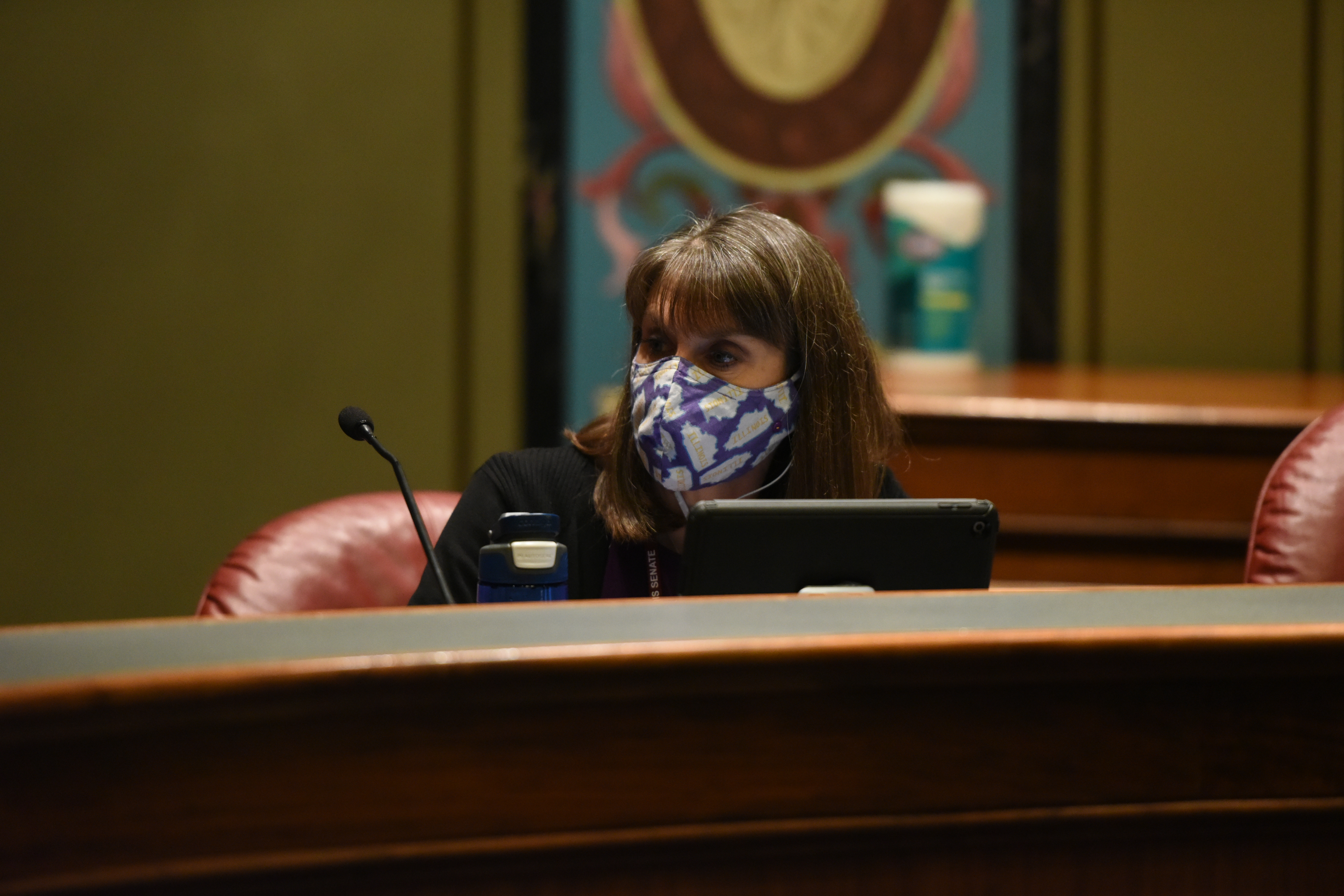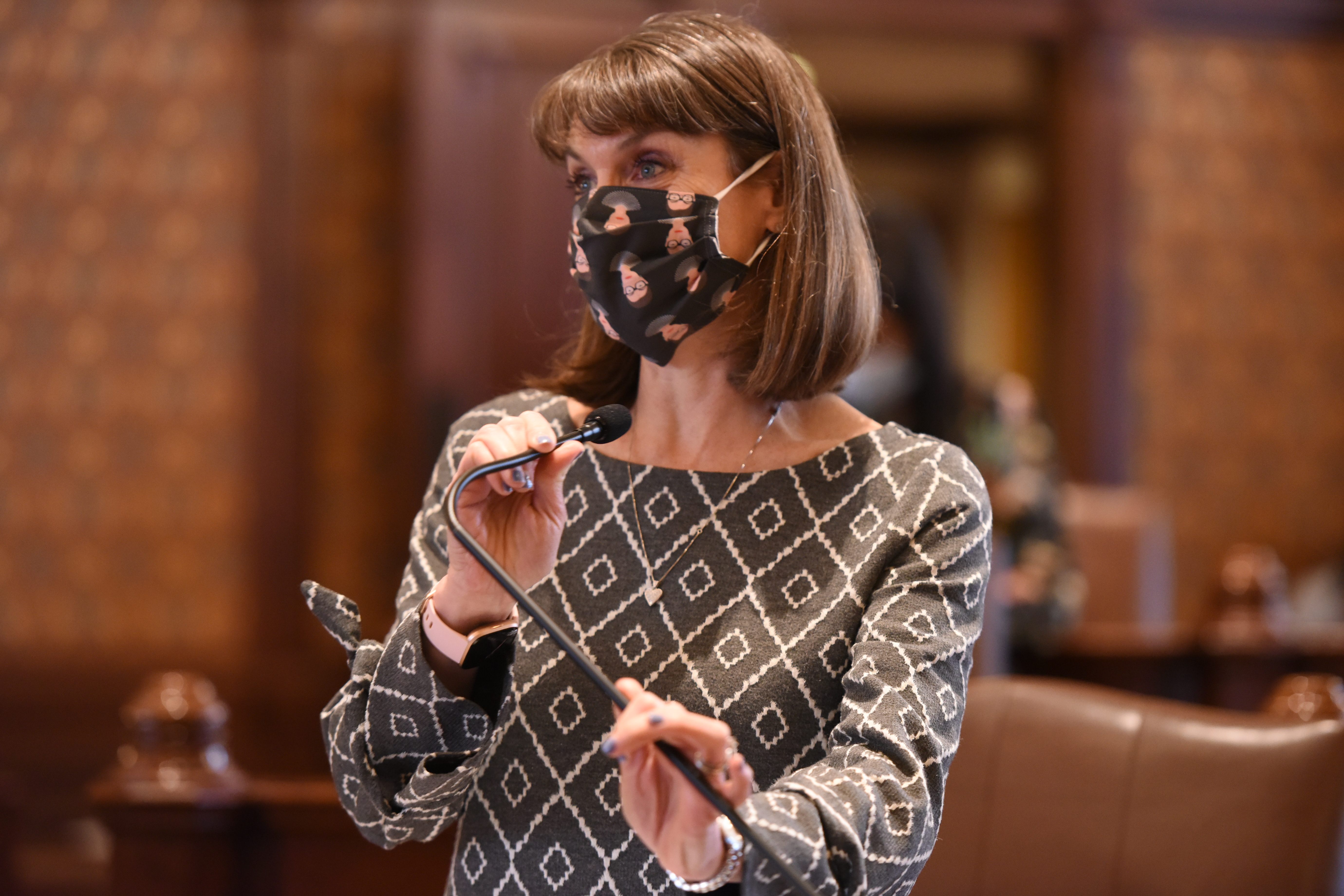- Details
- Category: Press Releases
SPRINGFIELD – Student loan debt is the 2nd highest consumer debt category, just behind mortgages. To help address this issue, today, State Senator Laura Fine (D-Glenview)’s Senate Bill 3032 passed the Senate unanimously. Part of this legislation prohibits universities from withholding official transcripts from potential employers as a means of debt collection.
“It is discouraging for students who have made immense sacrifices to earn their degrees to be denied access to their transcripts until their debt is paid off,” Senator Fine said. “Having access to their transcripts is essential for students to seek the jobs necessary to pay off their debts, as well as finding a fulfilling career.”
Under Senator Fine’s legislation, universities would be prohibited from withholding transcripts as a means of debt collection. The bill also requires colleges to institute a hardship policy to ensure students that have to withdraw due to significant financial or physical hardship leave school with as little debt as possible. Additionally, the legislation would prevent student debt that gets sent to a collection’s agency from being used against a student’s credit score.
“Student debt is a serious burden on our students, universities, and economy,” Senator Fine said. “I am hopeful that this bill will give students more economic stability and allow them to seek employment reflective of the credentials they earned through their hard work, regardless if they still have student debt.”
SB 3032 passed the Senate unanimously on Wednesday. It now goes to the House for further consideration.
- Details
- Category: Press Releases
SPRINGFIELD – Many times, a spouse must leave his or her job to care for a loved one. This results in a loss of family income. Under Senate Bill 3132 sponsored by State Senator Laura Fine (D-Glenview), people with disabilities may soon be able to choose their spouse to serve as their provider of personal care instead of having to hire a personal assistant.
“This legislation would be life-changing for families struggling to make the choice between their job and caring for a loved one,” Senator Fine said. “This initiative would also fill the gap we are experiencing with the medical worker shortage.”
Currently, people with severe disabilities may hire their own personal assistant to help care for them through agreements between the patient and the Division of Rehabilitation Services (DRS). Under this agreement, DRS supplies and pays personal assistants to support designated patients. However, there is a current shortage of medical staff to fill these vacancies. This is causing many families to choose between the quality of life of disabled family members or financial stability, as many spouses are leaving the workforce to help care for their loved ones without compensation.
To address these issues, Senator Fine’s legislation allows for people with disabilities to select their spouse as their provider. This designation allows for the family to receive a paycheck as if they were the DRS employee. Senator Fine is hopeful about the impact this may have on families who have been impacted by the medical worker shortage.
“People with disabilities and their families deserve to have the highest quality of life and care,” Senator Fine said. “Allowing loved ones to be designated as one’s provider of personal care will eliminate the unthinkable choice between finances and their family, and ensure they will always have access to the support they deserve.”
SB 3132 passed the Health committee Tuesday. It now goes to the Senate floor for debate.
- Details
- Category: Press Releases
SPRINGFIELD – State Senator Laura Fine (D-Glenview) is leading a measure aimed at growing the mental health professional workforce in Illinois, as the current workforce is struggling to keep up with increasing demand.
“The shortage of behavioral health care professionals is a huge roadblock for people seeking quality mental health care,” said Sen. Fine. “I am committed to addressing this pressing issue to ensure people have access to the best mental health care possible, and that providers are supported during these unprecedented times.”
In Illinois, there are only 14 behavioral health care professionals for every 10,000 Illinois residents. Many people are forced to wait longer for essential treatment or forego health care entirely because of this gap. This can be detrimental to their mental and physical well-being.
To address these issues, SB 3617 focuses on expanding the current workforce. It will accelerate the process for out of state clinicians applying for licensure in Illinois, as well as suspending requirements for social workers, professional counselors, and clinical psychologists with licenses that have been inactive for five years. Additionally, it includes initiatives to support diversity in the mental health field, establishing tax credits, and many more provisions, all of which will encourage more quality, accessible care to those seeking assistance.
“It takes bravery to reach out to get treatment for a mental or behavioral health condition,” Fine said. “I hope that this measure will not only reduce the gap between available providers and patients, but also encourage people to find the provider that is the best fit for their mental health needs.”
Senate Bill 3617 passed the Behavioral and Mental Health committee Tuesday. It now goes to the Senate floor for debate.
- Details
- Category: Press Releases
SPRINGFIELD –Care will be more tailored to the needs of patients with Alzheimer's disease or dementia thanks to a new initiative sponsored by Senator Laura Fine (D-Glenview) in conjunction with the Alzheimer's association.
“Currently, caregivers are not required to be trained on how to care for patients with dementia or Alzheimer’s,” Fine said. “This needs to change so that people living with these conditions will have access to best care possible to address their specific needs.”
Over 230,000 people in Illinois are living with Alzheimer’s. Many take part in the Community Care Program, which allows seniors with or without these conditions to receive in-home and community-based service from their own homes. Employees that provide this service are currently required to complete 12 to 24 hours of training, but training specific to dementia and Alzheimer’s patients is optional.
Fine’s measure would require employees and contractors with the Department of Aging Service who provide direct service to individuals in the Community Care program to complete at least two hours of training on Alzheimer’s and dementia prior to the start of their employment. Fine believes that condition-specific training is essential to ensuring adults living with these conditions are able to be cared for and better understood.
“Many types of care for people with Alzheimer’s or dementia are simply not covered in generalized training,” Fine said. “I am hopeful that this measure will provide training that explores medical and sensitivity issues related to dementia and Alzheimer’s patients to give them the quality care that they deserve.”
Senate Bill 3707 passed the Healthcare Access and Availability committee today. It now goes to the Senate floor for further deliberation.
More Articles …
Page 41 of 75











